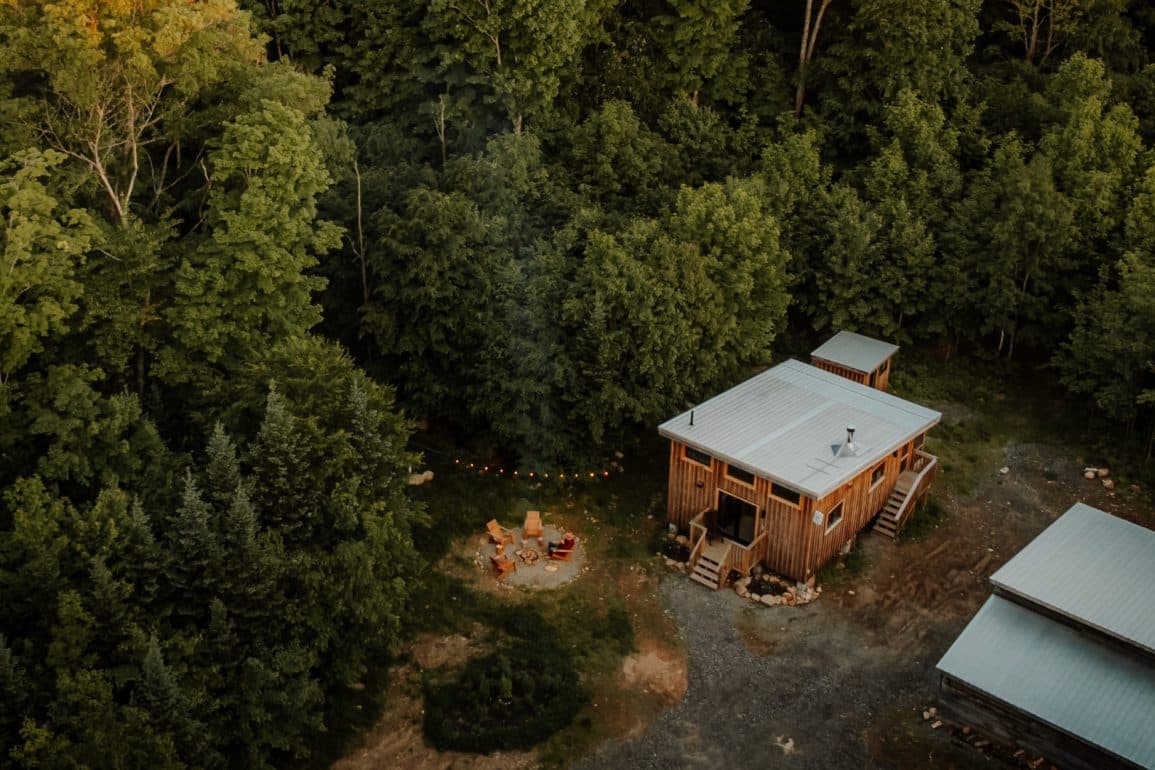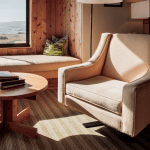Earth Day serves as a yearly reminder of our duty to protect the environment. It’s a call to action for us to all do our part—not only for governments and individuals, but businesses as well.
Vacation rentals are no exception. Tourist accommodations overall, including both vacation rentals and hotels, are responsible for 1% of global emissions and 20% of tourism emissions. And while many people assume that vacation rentals have a smaller environmental footprint than hotels, a recent study has shown that’s not necessarily the case.
Luckily, vacation rental owners are also incredibly well positioned to make a difference. Getting to be your own boss also means that you get to call the shots, from your property’s energy source to whether or not you recycle. These large and small decisions add up, giving vacation rental owners the potential to make a tangible impact.
At Lodgify, many of our customers are doing just that. So, this Earth Day, we want to give a few of them the stage to share why they invest in sustainability and how their peers can do the same.
Let’s meet them and see what they have to say.
Meet our customers
Glassy Stays
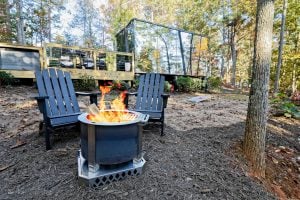
Managed by Ariel Haas and Jason Moon, Glassy Stays is proof that you don’t have to choose between luxury and sustainability. (Or individuality, for that matter!)
Settled amid pristine wilderness 20 minutes from downtown Asheville, North Carolina, Glassy Stays features one-way glass walls that look like mirrors from outside. From the inside, however, you have a full view of the surrounding beauty, allowing you to forest bathe 24/7.
What’s more, Glassy Stays is entirely off-grid and carbon neutral, relying on solar panels for its power, while still offering luxury amenities. These include a hot tub, a projector for watching TV and movies, and high-speed WiFi.
Foret Cabins
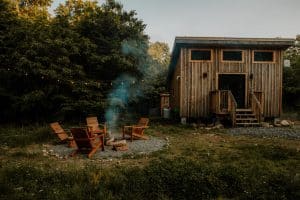
In Muskoka, Ontario you’ll find another off-grid Lodgify client in the form of Foret Cabins, owned and managed by Emma and Andrew Trousdale.
On top of being off-grid and powered by solar panels, Foret Cabins was built with sustainable building materials and designed to stay warm in winter and cool in summer to reduce power consumption. Emma and Andrew also use refillable and zero-waste guest consumables to minimize their impact on the environment.
Additionally, Foret Cabins is in the process of expanding to include 11 cabins and a spa, and will be aiming for a net-zero certification as well as a Sustainable Tourism Certification for Destinations in the process.
But unlike Glassy Stays, which aims to provide off-grid luxury, Foret Cabins hopes to help guests slow down and reconnect with what truly matters. For example, their website shares that “Although there is WiFi, we hope you’ll forgo using it for stargazing from the loft bed at night or cozying up in front of the wood stove.”
Ananda Eco House
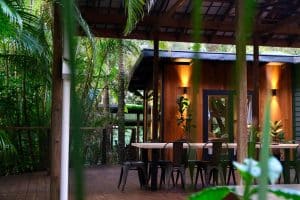
Located in a remote region of Australia’s Sunshine Coast, Ananda Eco House is a charming retreat surrounded by half an acre of dense rainforest.
We could write an entire article about this property’s sustainability. It’s as off-grid as possible, running off of solar panels, rain water, and composting toilets. It was designed with repurposed and second-hand materials, and its interior features many thrifted items to reduce its environmental impact.
The property owners, Britney Taylor and Michael Boyd, even choose its cleaning products and amenities with a zero-plastic mindset and encourage guests to reduce their footprint as much as possible by:
- Composting food scraps via the on-site compost bin
- Limiting use of one-time plastics
- Recycling cans/bottles
- Reading educational materials, available on-site, on how to make a positive impact
Finally, Ananda Eco House partners with One Tree Planted to plant a tree for every booking they receive.
And if all of that isn’t enough of a reason to make a booking, Ananda Eco House is also the perfect place to escape from everyday life. Whether by taking advantage of its ice bath and sauna, exploring the surrounding rainforest, or visiting nearby towns and wineries, you’re sure to enjoy this remote retreat.
Their insights on going green
Why do you feel it’s important for vacation rental hosts to think about sustainability?
There are many reasons to go green, regardless of your industry. But one thing Ariel, Emma, and Britney all agree on is that hosts have a responsibility to educate their guests.
Ariel (Glassy Stays): While we are in this as a business to make money and provide a service, we have an obligation to try and leave this world a better place for our children. If my vacation rental can show guests how it’s possible to live a life of luxury entirely off-grid, then it’s worth the added cost and headaches.
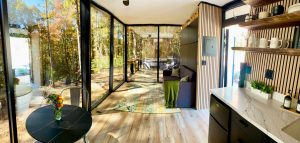
Emma (Foret Cabins): We feel like everyone should be thinking about sustainability. But especially for hosts, we have an opportunity to invite people to experience something that they might not have done otherwise. I always have guests asking where we get our reusable paper towels.
Britney echoed Ariel’s and Emma’s insistence that vacation rental hosts show their guests how they can live more sustainably. But she also went even further, touching on travelers’ “waste mindset” and explaining how sustainability benefits your finances and brand reputation.
Britney (Ananda Eco House): Short-term accommodation rentals—like hotels, Airbnb properties, and vacation homes—play a significant role in the tourism industry. As such, they have a responsibility to consider sustainability for several reasons:
- Opportunity for education and behavior change: While on vacation, people often have more time and openness to learn about new things, including sustainability practices. Experiencing eco-friendly initiatives implemented by accommodation providers, such as refillable toiletry dispensers, recycling programs, or energy-efficient lighting, can inspire guests to implement similar practices in their everyday lives once they return home.
- Plastic usage and waste mindset: Many travelers adopt a more wasteful mindset while on holiday, leading to increased plastic usage through single-use items like water bottles, toiletries, and packaging for convenience. This behavior contributes to environmental degradation and pollution, particularly in destinations that may lack proper waste management infrastructure.
- Resource efficiency and cost savings: Implementing sustainable practices in short-term accommodations can also lead to cost savings in the long run. Measures such as installing energy-efficient appliances, reducing water usage, and minimizing waste not only benefit the environment but also contribute to lower operational expenses for the property owner.
- Customer expectations and brand reputation: Increasingly, travelers are seeking out accommodations that align with their values, including sustainability. By prioritizing eco-friendly practices, short-term rental properties can attract environmentally conscious guests, enhance their brand reputation, and differentiate themselves in a competitive market.
As Britney points out, sustainability efforts don’t necessarily need to come at the expense of other business goals. Waste reduction can only save you money. And as travelers continue to prioritize sustainability (and vote with their dollars), showcasing your sustainable practices can help set your property apart.
How do you approach budgeting for sustainability initiatives in your vacation rental property?
Staying within budget is paramount to vacation rentals’ success. So we had to ask, how do these businesses invest in sustainability without it affecting their bottom line?
Ariel (Glassy Stays): It’s certainly more expensive to set up the property off-grid, but as an investment, over time we will save money. It’s certainly not easy to set up but for those passionate about it, anything can be learned with a little time and energy.
Emma (Foret Cabins): We use a local refillery and buy products in bulk to reduce costs. Our guests are looking for environmentally friendly travel, so we build it into our pricing structure. Ultimately, I’ve never had to replace our broom because it’s made from wood and horsehair—yes, it was expensive, but in four years we probably would have had to buy multiple plastic ones. I think in the end, paying higher prices for sustainable products can eventually save money in the long run.
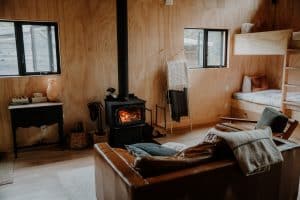
Britney (Ananda Eco House): I made a list of all the things that we purchase on a regular basis. I researched the baseline cost that we were currently purchasing our products at, and then researched the cost of plastic-free eco alternatives. Often buying these items in bulk meant that there was either no difference in price or only a slight increase. Knowing that we are doing the right thing and reducing the amount of plastic and toxins is worth it for us, and budget-wise we are still very much within our limits.
There you have it: Buying sustainable products isn’t as expensive as you might think when you 1) buy in bulk and 2) factor in the savings over time thanks to the higher quality and longevity. Emma also had a great point: That if your target guests are intentionally seeking out sustainable accommodations, they likely won’t mind paying more for them.
What advice would you give to hosts who want to make their properties more eco-friendly but don’t know where to start?
Going green is a monumental change that can feel overwhelming. Fortunately, as our clients point out, you don’t have to do everything at once.
Ariel (Glassy Stays): Start small. Swap out lights for LEDs, for example. Ask a friend for help. Search YouTube for ideas or, even better, add some solar panels and a battery and start yourself down the scary road of using the sun! Once you get started with this, the rest becomes easy.
Emma (Foret Cabins): Do a walkaround of your property and audit every single item and find an alternative. Everything from towels to shampoo to cleaning products. The internet is an amazing resource to find eco-friendly alternatives!
Britney (Ananda Eco House): Research sustainable brands and refillable products, and look into subscription services for these items as there are often discounts. Who Gives A Crap (toilet paper), Cove (toiletries and candles), Minq, Resparkle, and Earthwise (cleaning products) are some of the brands that we use.
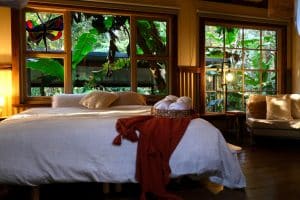
As Ariel, Emma, and Britney all agree, it’s best to start small with simple swaps for items such as light bulbs and toiletries. Britney also recommends enlisting guests’ help:
Communicate your sustainability practices to your guests and ask them to actively assist (reducing stains on towels, reducing water usage, using the compost bin, etc.). This is appreciated more than you’d think.
And Britney’s last piece of advice?
Find your “why.” If you know your “why,” you’ll make it happen.
Happy Earth Day!
For all the vacation rental owners out there who are curious about going green, we hope these insights have been helpful. These businesses certainly show that it is possible to have a thriving vacation rental business and be environmentally conscious, and we’re inspired by their efforts!
Featured image via Foret Cabins
